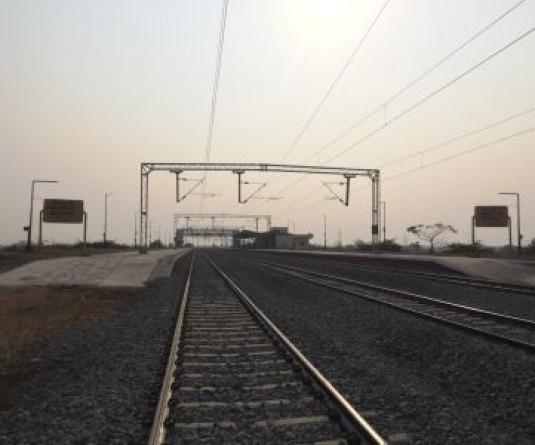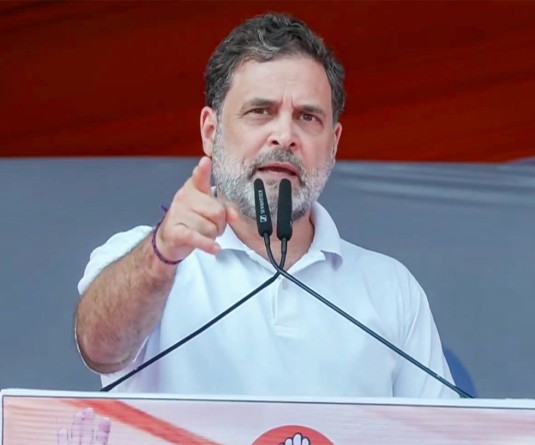
NEW Delhi, January 10 (PTI): New Delhi The Election Commission wants the government and Parliament to “revisit” the issue of criminalisation of politics and take urgent steps to bar candidates facing serious charges of murder, rape and extortion from contesting elections. Worried that criminalisation of politics or politicisation of criminals is an ill plaguing the electoral system increasingly, the Commission says the issue needs to be revisited to enhance the faith of citizens in democracy and to improve the quality of elections. “I would like to reiterate that such temporary debarment will be in the larger public interest,” Chief Election Commissioner S Y Quraishi said in an interview. It covered issues ranging from electoral reforms to mushrooming growth of political parties to independent functioning of the Commission.
“The fact is that power to disqualify anyone is not with EC but with Parliament. Under the existing law, a person is disqualified for contesting election only on conviction,” he said. “It is ironic that a person in jail is free to contest elections during the pendency of trial, though he is not eligible to vote,” the CEC said. He recalled that the Commission had recommended that persons facing serious criminal charges like murder, rape, extortion etc, where punishment on conviction may exceed five years, should be debarred from contesting elections during the pendency of their cases before the courts. The EC also cautiously added that the bar may apply only where the cases had been filed more than six months before the elections, he said. However, the Parliamentary Committee that went into the issue, did not approve it on the ground that under the jurisprudence followed in the country, a person is presumed to be innocent unless convicted and people are implicated in many false cases due to political rivalry and other reasons, Quraishi said.
Quraishi dismissed the defence often given to allowing criminals facing charges to contest elections on the ground in Indian jurisprudence one is presumed innocence until found guilty. Quraishi said, “If the view of presumed innocence of a undertrial prisoners, who are yet to be convicted, is to be accepted, why are they deprived of their Fundamental Rights of free movement, freedom to live with their families, freedom to follow their own professions, freedom of speech and expression. And if such Fundamental Rights can be abridged, why not the right to contest an election which is only a statutory right? Here we are talking about 70 per cent of a total of nearly four lakh prisoners in the country who happen to be undertrials.”
He said the plea that persons can be falsely implicated is to decry judicial system. The EC has suggested that the temporary restriction on the right to contest should be imposed only where a charge has been framed by the competent court on due application of its judicial mind. Further, such a case should have been instituted at least six months before the election. “The Commission finds that the entry of criminals into the polling arena has become a competitive phenomenon in which political parties have, perforce to field criminal elements once their opponents field candidates of similar background,” he said.
Quraishi said “one feels embarrassed when various election watch organisations come out with disturbing data of large number of candidates in poll fray facing serious charges, sometimes quite heinous, punishable with life imprisonment or even death. “One has to hang one’s head in embarrassment when people point out at international fora that out of 543 members of the present Lok Sabha, as many as 162 are facing criminal charges and of them 76 are charged with commission of serious criminal offences,” he rued. Noting that in the last Lok Sabha, the number of Mps involved in criminal cases was 128 and of them 58 were facing serious charges, he said “the point of concern is that the number of MPs with pending criminal cases is going up”.
In the recently held election to the Bihar Legislative Assembly, as many as 141 newly elected MLAs (59 per cent) of the total 243 MLAs were facing criminal charges. Of them, 85 MLAs were facing serious charges like murder, attempt to murder etc, the CEC said. In 2005 Bihar assembly polls, 117 MLAs had criminal cases pending against them. Welcoming BSP’s recent announcement that it would not field any criminally tainted candidates in the 2014 assembly polls, he said “this is a welcome and bold step which will set a good precedent. I hope it happens and all parties follow suit”. He also favoured a Constitutional amendment equating Election Commissioners with the CEC in the matter of removal to protect the independence of the institution.
His suggestion to the government comes against the backdrop of one of his predecessors CEC N Gopalaswami writing to the President seeking his immediate predecessor Navin Chawla’s removal as EC on the ground of his “partisan” functioning. The government had rejected Gopalaswami’s recommendation and appointed Chawla as CEC. He also wants a provision either in law or by some government resolution that the senior most EC should be automatically elevated as CEC in order to instill a feeling of security in the minds of the ECs and that they are insulated from executive interference in the same manner as CEC. Recalling the debate in the Constituent Assembly in which Constitution makers laid great stress on ensuring independence of the one-man EC, Quraishi said that they provided that the CEC shall not be removed except by impeachment like a judge of the Supreme Court.
It was also provided that the other ECs shall not be removed from office unless so recommended by the CEC. The CEC said since 1993, the Commission has become a regular multi-member body with three members all enjoying equal powers and status. “Therefore, it is imperative in the changed circumstances that the two Election Commissioners are also provided the same Constitutional protection in the matter of their removal from office as it available to the CEC, so that the Election Commissioners also act as independently as the CEC,” he said.
Besides, the CEC also made some suggestions which have implications for the Commission’s functional independence. Quraishi said that the administrative expenditure on the EC was not ‘charged’ on the Consolidated Fund of India, but is voted whereas similar expenditure in UPSC and CAG etc is charged expenditure. “The Commission should also have the same independence in the matter of selection and appointment of its officers and staff as enjoyed by the Secretariats of both the Houses of Parliament and the Supreme Court. “Budget and staffing are two matters in which the Election Commission should not come under any semblance of a control”, he said.
“The fact is that power to disqualify anyone is not with EC but with Parliament. Under the existing law, a person is disqualified for contesting election only on conviction,” he said. “It is ironic that a person in jail is free to contest elections during the pendency of trial, though he is not eligible to vote,” the CEC said. He recalled that the Commission had recommended that persons facing serious criminal charges like murder, rape, extortion etc, where punishment on conviction may exceed five years, should be debarred from contesting elections during the pendency of their cases before the courts. The EC also cautiously added that the bar may apply only where the cases had been filed more than six months before the elections, he said. However, the Parliamentary Committee that went into the issue, did not approve it on the ground that under the jurisprudence followed in the country, a person is presumed to be innocent unless convicted and people are implicated in many false cases due to political rivalry and other reasons, Quraishi said.
Quraishi dismissed the defence often given to allowing criminals facing charges to contest elections on the ground in Indian jurisprudence one is presumed innocence until found guilty. Quraishi said, “If the view of presumed innocence of a undertrial prisoners, who are yet to be convicted, is to be accepted, why are they deprived of their Fundamental Rights of free movement, freedom to live with their families, freedom to follow their own professions, freedom of speech and expression. And if such Fundamental Rights can be abridged, why not the right to contest an election which is only a statutory right? Here we are talking about 70 per cent of a total of nearly four lakh prisoners in the country who happen to be undertrials.”
He said the plea that persons can be falsely implicated is to decry judicial system. The EC has suggested that the temporary restriction on the right to contest should be imposed only where a charge has been framed by the competent court on due application of its judicial mind. Further, such a case should have been instituted at least six months before the election. “The Commission finds that the entry of criminals into the polling arena has become a competitive phenomenon in which political parties have, perforce to field criminal elements once their opponents field candidates of similar background,” he said.
Quraishi said “one feels embarrassed when various election watch organisations come out with disturbing data of large number of candidates in poll fray facing serious charges, sometimes quite heinous, punishable with life imprisonment or even death. “One has to hang one’s head in embarrassment when people point out at international fora that out of 543 members of the present Lok Sabha, as many as 162 are facing criminal charges and of them 76 are charged with commission of serious criminal offences,” he rued. Noting that in the last Lok Sabha, the number of Mps involved in criminal cases was 128 and of them 58 were facing serious charges, he said “the point of concern is that the number of MPs with pending criminal cases is going up”.
In the recently held election to the Bihar Legislative Assembly, as many as 141 newly elected MLAs (59 per cent) of the total 243 MLAs were facing criminal charges. Of them, 85 MLAs were facing serious charges like murder, attempt to murder etc, the CEC said. In 2005 Bihar assembly polls, 117 MLAs had criminal cases pending against them. Welcoming BSP’s recent announcement that it would not field any criminally tainted candidates in the 2014 assembly polls, he said “this is a welcome and bold step which will set a good precedent. I hope it happens and all parties follow suit”. He also favoured a Constitutional amendment equating Election Commissioners with the CEC in the matter of removal to protect the independence of the institution.
His suggestion to the government comes against the backdrop of one of his predecessors CEC N Gopalaswami writing to the President seeking his immediate predecessor Navin Chawla’s removal as EC on the ground of his “partisan” functioning. The government had rejected Gopalaswami’s recommendation and appointed Chawla as CEC. He also wants a provision either in law or by some government resolution that the senior most EC should be automatically elevated as CEC in order to instill a feeling of security in the minds of the ECs and that they are insulated from executive interference in the same manner as CEC. Recalling the debate in the Constituent Assembly in which Constitution makers laid great stress on ensuring independence of the one-man EC, Quraishi said that they provided that the CEC shall not be removed except by impeachment like a judge of the Supreme Court.
It was also provided that the other ECs shall not be removed from office unless so recommended by the CEC. The CEC said since 1993, the Commission has become a regular multi-member body with three members all enjoying equal powers and status. “Therefore, it is imperative in the changed circumstances that the two Election Commissioners are also provided the same Constitutional protection in the matter of their removal from office as it available to the CEC, so that the Election Commissioners also act as independently as the CEC,” he said.
Besides, the CEC also made some suggestions which have implications for the Commission’s functional independence. Quraishi said that the administrative expenditure on the EC was not ‘charged’ on the Consolidated Fund of India, but is voted whereas similar expenditure in UPSC and CAG etc is charged expenditure. “The Commission should also have the same independence in the matter of selection and appointment of its officers and staff as enjoyed by the Secretariats of both the Houses of Parliament and the Supreme Court. “Budget and staffing are two matters in which the Election Commission should not come under any semblance of a control”, he said.






